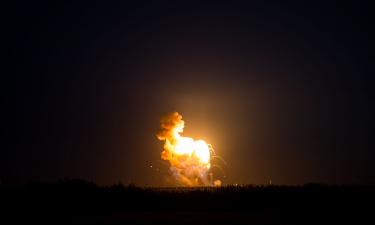David Crary: Many in US Fought for Foreign Armies
NEW YORK (AP) - John Walker Lindh picked the wrong cause at the wrong time, joining the Taliban army not long before it became a U.S. military target. Thousands of other Americans have fought for foreign armies with very different results.
As long ago as the French Revolution, as recently as the war in Kosovo, Americans have left home soil to fight for other countries, sometimes dying, sometimes returning home to harassment, often winning accolades as heroes.
The U.S. government does not encourage Americans to fight under foreign flags, but it does not prohibit it - unless, as in Lindh's case, the foreign army engages in war with the United States. Americans formed their own brigade in the Spanish Civil War, they have joined the French Foreign Legion, they have served by the thousands in Israel's military.
``It's always been a gray area,'' said Jonathan Turley, a national security and constitutional law expert at George Washington University.
``The government has often preferred to remain blissfully ignorant of Americans engaged in that type of activity unless the U.S. citizen is joining a hostile force.''
In both world wars, American volunteers served with Allied forces before the U.S. government entered the fight. American pilots gained fame in World War I as members of France's Escadrille Americaine, later renamed the Escadrille Lafayette to make clear it had no official U.S. backing.
More controversial was the Abraham Lincoln Brigade - roughly 2,800 Americans who fought for the loyalists in the Spanish Civil War against the army led by Gen. Francisco Franco. Franco was backed by Italy's Mussolini and Germany's Hitler; the losing loyalists were supported by the Soviet Union.
To many Americans, then and now, the Lincoln Brigade volunteers were early heroes in the struggle against fascism. But U.S. authorities at the time tried to prevent any American involvement in Spain, and critics depicted the volunteers as minions of international communism.
``When we got home, we encountered a certain amount of acclaim, a certain amount of being ignored and a certain amount of being persecuted,'' said Lincoln Brigade veteran Abe Osheroff, 86, of Seattle. ``We were witch-hunted - you couldn't get a job in government, a teaching job.''
Even after 60 years, some animosity toward the Lincoln Brigade persists. Last February, a legislative committee in New Hampshire voted to remove from the statehouse a plaque honoring brigade members. Critics of the plaque noted that the volunteers had defied a U.S. ban on travel to Spain.
In recent decades, many of the Americans joining foreign armies have been motivated by ethnic or religious bonds.
A few American Muslims fought for Bosnia's Muslim-led government against Serb forces before NATO intervened in 1995, and hundreds of Albanian-Americans fought in Kosovoduring Yugoslavia's 1998-1999 crackdown on ethnic Albanians. The blindfolded bodies of three of the Kosovo volunteers - brothers from New York City - were discovered in June atop a mass grave in Yugoslavia.
Thousands of Americans have served in Israel's armed forces, most of them Jews with dual citizenship who emigrated from the United States and became subject to Israel's compulsory military service policy.
About 1,000 Americans were among more than 3,500 foreigners - known as the Machal volunteers - who fought for Israeli independence in 1947-48. One of them, D-Day veteran David Marcus, commanded Israeli troops in the 1948 battle for Jerusalem, was killed accidentally by an Israeli sentry and later received a hero's burial at his alma mater, the U.S. Military Academy.
Critics of dual citizenship say divided loyalties could lead to problems.
``It's theoretically possible that two nations 8,000 miles apart don't have identical foreign interests, and that we could come into conflict with Israel in the future,'' said Robert Hazo, a Middle East policy analyst in Pittsburgh.
While the U.S. government has tolerated Americans serving in the Israeli military, it encourages any citizen abroad to avoid joining a foreign army if possible.
``Such participation ... in the internal affairs of foreign countries can cause problems in the conduct of our foreign relations and may involve U.S. citizens in hostilities against countries with which we are at peace,'' the State Department says in an advisory document.
Tracy Rumsower, now a 33-year-old sports photographer in Austin, Texas, was simply seeking adventure when he joined the French Foreign Legion in 1991.
He served in Africa, Asia and Bosnia, where he helped protect relief operations during the siege of Sarajevo. He married a Frenchwoman, and travels frequently to France.
``It was an experience that opened my eyes,'' he said of his five-year legion stint. ``I went from being an isolated American to realizing there's a whole world out there.''
Rumsower has little sympathy for Lindh, the 20-year-old Californian now detained on a U.S. warship in the Arabian Sea.
``He knew what he was doing,'' Rumsower said. ``He served interests contrary to the United States, and it's not something we should let slide.''
Turley, the George Washington University professor, noted that Lindh is a Muslim convert who started out on a path others have taken.
``Other U.S. citizens did precisely what he did in fighting for their religions in Bosnia, Kosovo and other hot spots,'' Turley said. ``However, whatever his initial motivations were, the government can argue that he allowed himself to drift into a direct conflict with his own nation.''
https://www.serbianna.com/news/world/05.shtml
Subscribe to Pravda.Ru Telegram channel, Facebook, RSS!





